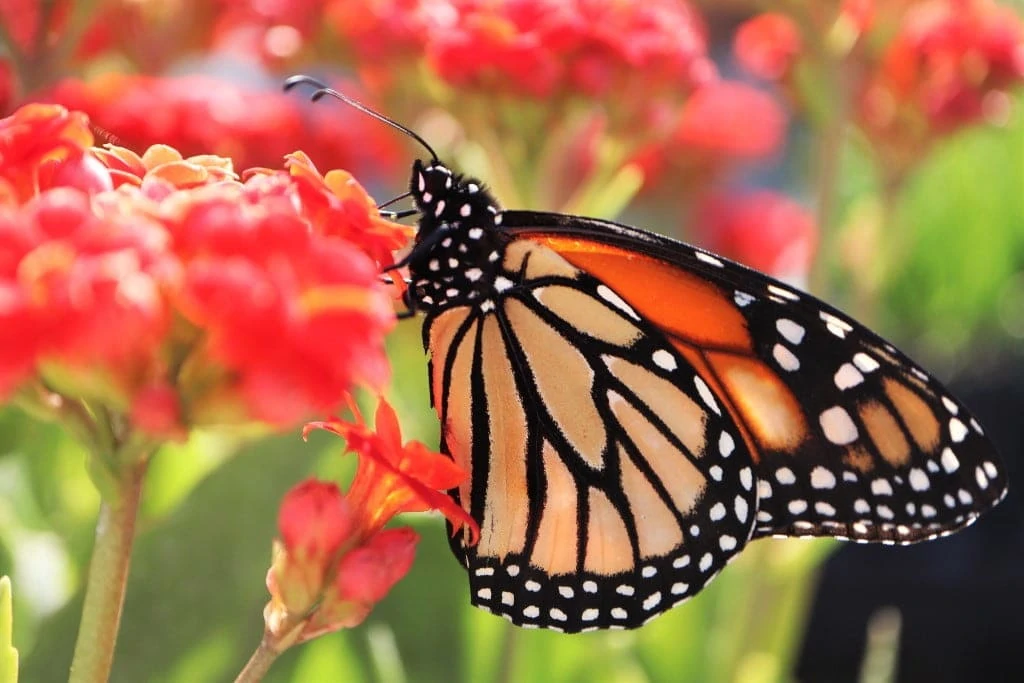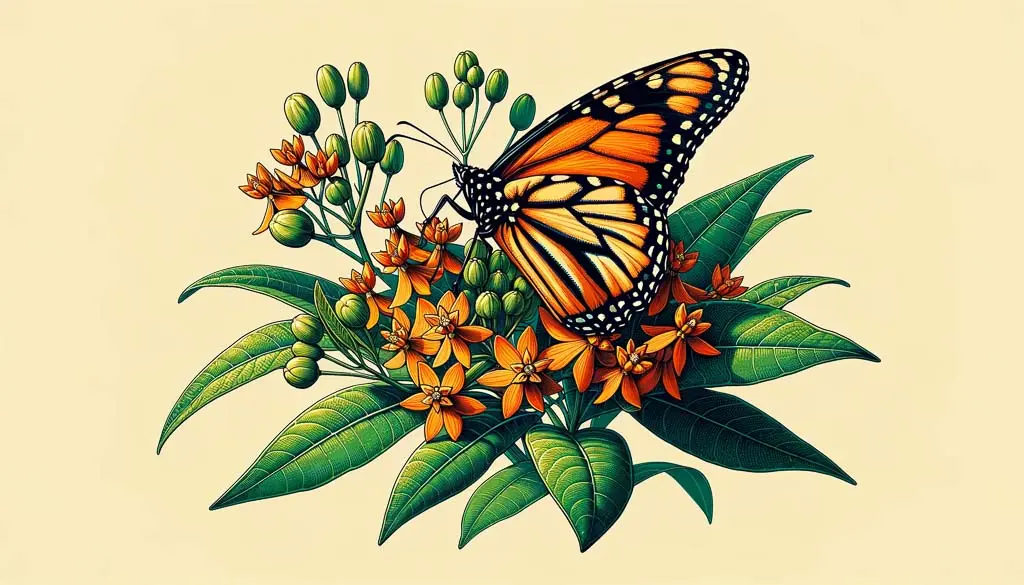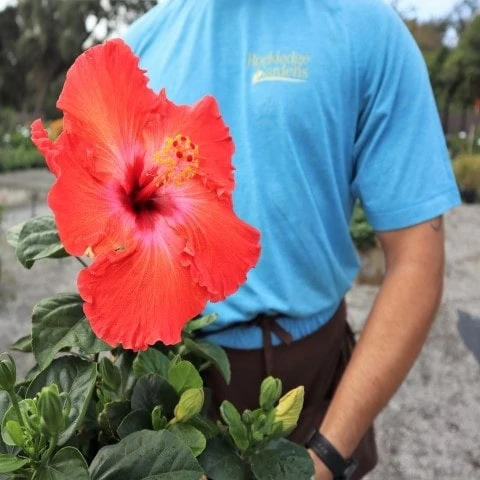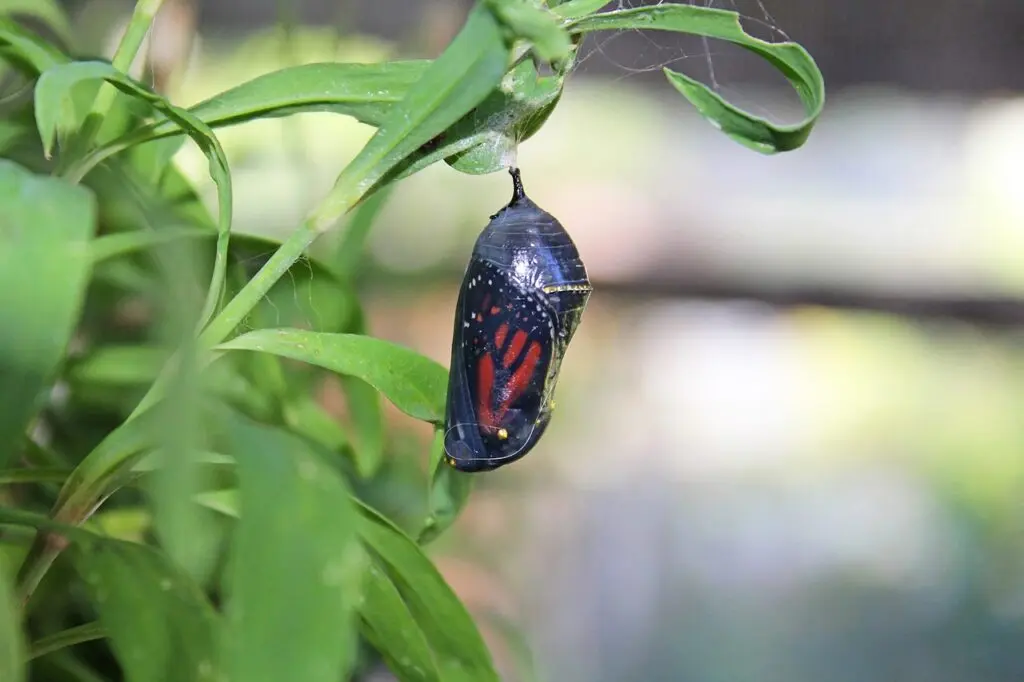by Amanda Rose Newton
The monarch butterfly, with its vibrant orange and black wings, is an iconic symbol of beauty, grace, and transformation. Beyond their aesthetic appeal, these butterflies are known for their astonishing migratory journey, spanning thousands of miles from North America to Mexico.

In this week’s post, we’ll dive into the intriguing world of monarch butterfly migration, exploring the ‘how’ and ‘why’ behind this incredible phenomenon and discovering how we can contribute to their well-being by being mindful of the plants we choose to support them.
The Monarch’s Migration: A Spectacular Adventure
How Do They Do It?
Monarchs are the only butterfly species known to make a two-way, multi-generational migration as far as 3,000 miles. Their journey is both extraordinary and complex, involving multiple generations.
Each winter, millions of monarchs congregate in the oyamel fir forests of Mexico, escaping the cold temperatures of North America. These overwintering sites are critical for their survival.
As winter ends, the adult butterflies begin their journey northward, flying as far as 100 miles a day. These butterflies are the offspring of those that overwintered in Mexico.
Monarchs mate and lay eggs on milkweed plants as they move north. The milkweed is the only plant that monarch caterpillars can feed on. Once they hatch, the caterpillars devour the milkweed’s leaves, fueling their transformation.

As the new generations continue north, their lifespans are short—only a few weeks. The butterflies may go through several generations before reaching their northernmost destination.
In late summer or early fall, the last generation of the year emerges. These monarchs live longer and embark on a non-stop flight back to their overwintering sites in Mexico.
Why Do They Migrate?
The question of why monarchs migrate has intrigued scientists for years. While much remains to be understood, it is believed that factors like temperature, daylight, and genetics play a role. Monarchs migrate because they cannot survive the harsh winters of the north, and their survival depends on finding suitable milkweed to feed and lay their eggs.
How You Can Help: Mindful Planting for Monarchs
Milkweed
One of the most critical aspects of supporting monarchs during their migration is providing ample milkweed along their route.

Unfortunately, not all milkweed is created equal, and planting the wrong type can be harmful.
The Pitfalls of Tropical Milkweed
Tropical milkweed (Asclepias curassavica) is a popular garden plant due to its vibrant flowers and ease of care. However, it has become a controversial choice for monarch conservation. Tropical milkweed can disrupt monarch migration patterns in a few ways:
Delayed Migration: Unlike native milkweed species, tropical milkweed doesn’t die back in the fall. As a result, it encourages monarchs to remain in regions where they should be migrating.
Parasites and Disease: Overwintering monarchs can accumulate higher levels of parasites and diseases when they stay too long in one area.
Planting Native Milkweed Species
Instead of tropical milkweed, consider planting native milkweed species that are natural to your region.

Native milkweed species provide food and breeding grounds for monarchs without the risks associated with tropical milkweed. Lucky for you, Rockledge Gardens carries exclusively native milkweeds.
Here are a few tips for supporting monarchs:
Buy from reputable garden centers: Garden centers will know which type of milkweed will grow best in your garden and know the importance of avoiding pesticide drift on these plants.

Avoid tropical milkweed: If you already have tropical milkweed, consider cutting it back in the fall to encourage monarchs to continue their migration.
Include nectar plants: Monarchs need nectar plants for energy during their journey. Plant a variety of nectar-rich flowers to provide sustenance for the grown-ups.
Educate and advocate: Spread awareness about the importance of native milkweed and monarch conservation. Encourage others to plant responsibly.
Avoid captively raising monarchs: When reared indoors, monarchs miss the crucial cues for migration and may not exhibit the natural behaviors necessary for their journey. Additionally, captive-reared monarchs may face challenges upon release, such as unfamiliar environments, predators, and a disrupted migratory pattern.

While raising monarchs can be a fascinating educational experience, it’s essential to recognize that their natural migration instincts should not be interfered with, and efforts should focus on conserving their habitats and food sources instead.
Monarchs are awe-inspiring creatures, and their migration is a testament to the wonders of the natural world. By making informed choices about the plants we cultivate and being mindful of their migration, we can play a role in ensuring that this magnificent journey continues for generations to come.
For more research and resources for monarchs, check out: https://monarchjointventure.org/


